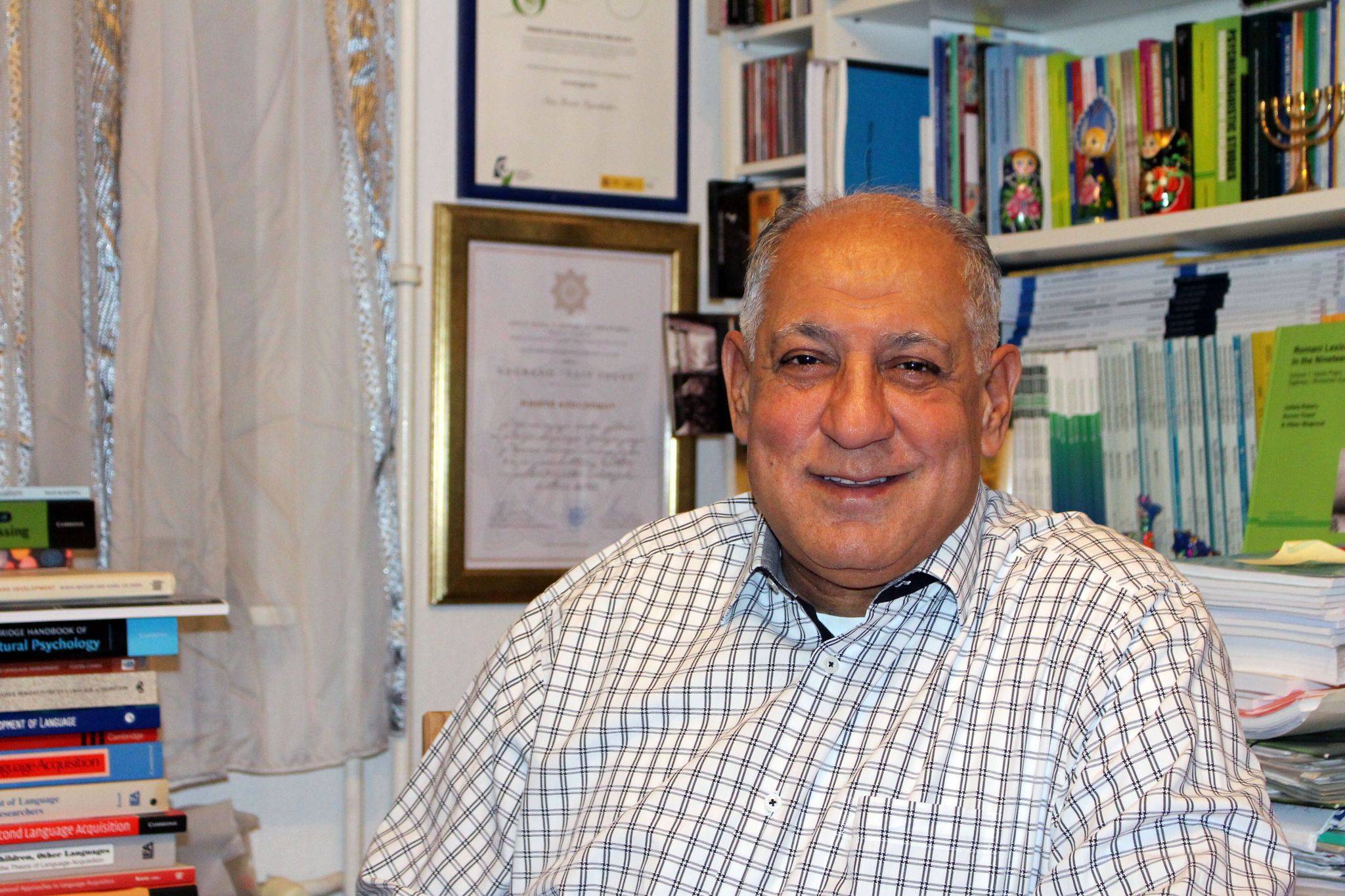
Khrysto Kiuchukov: why solidarity with Ukrainian Roma is important
Khrysto Kiuchukov was born in a conservative Roma family in the town of Provadia, located in Bulgaria. The family was engaged in the traditional craft of Roma – weaving baskets and selling them. Khrysto’s parents hoped that their son would continue the family tradition, but from a young age, Khrysto dreamed of science and knowledge. Today he is one of the most famous Roma, has three doctorate degrees (pedagogical sciences, general linguistics and theory of education and didactics), and is a leading specialist in the field of Romani languages and an expert on the education of Romani children. In 2008, due to the difficult economic situation in Bulgaria, Khrysto moved to Germany, where he still lives. Since 2017, Dr. Kiuchukov has been a full-time professor at the University of Silesia in Katowice. It was at the university that he learned about the beginning of the war.
In the course of a conversation with Janush Panchenko, one of the most famous Roma of our time tells about the war and Ukrainian Roma:
In the photo: Janush Panchenko and Dr. Kiuchukov. January 2023. Berlin
How did you react to the news about the start of the war in Ukraine?
When I learned that the war had started, the first thing that came to my mind was what would happen to the Ukrainian Roma? I have done a lot of research on World War II, the situation of the Roma in that war, and the Roma Holocaust. It is very surprising that in the 21st century what happened eighty years ago is being repeated. I didn’t want to believe it, but unfortunately, the reality is that Russia invaded Ukraine. We immediately started rallying here to help the Ukrainian Roma.
What prompted you to help the Ukrainian Roma?
I wanted to show my solidarity with the Ukrainian Roma and help them, so we sent money for support. In Roma culture, it is important to show support and help to people to show that you care. Recently, the Turkish Roma were also affected by the earthquake, and we also helped them. Roma philosophy is to always support each other, regardless of which Roma group you belong to. It is important that we are connected by a common culture and history, regardless of which country we live in. Historically, one group of Roma lives in Ukraine, another in Romania, the third in Bulgaria or Slovakia, but we all belong to one people. Therefore, it is important to support each other, regardless of the place of residence, and help in case of need.
In the photo: the home library of Dr. Kiuchukov
After the beginning of the invasion of Russia on the territory of Ukraine, many Ukrainians became refugees in Europe, including in Germany. Do you have experience working with Ukrainian refugees?
When there is a war, refugees appear. I worked in public organizations that hosted Ukrainian Roma migrants in Germany and helped these organizations communicate with refugees from Ukraine, as I speak Romani and Russian. While working as a translator, I noticed that the treatment of Roma in Germany is different from the treatment of other immigrants from Ukraine. Roma are not received as positively as others. This shows that there is a strong prejudice and open racist attitude towards the Roma in European countries. I currently work for a German organization that helps Roma integrate into German society, overcome the language barrier, find work, and more. From my practice, I have noticed that Roma do not trust others, they are wary of treating themselves badly. Therefore, when they see me, there is a kind of “chemistry”, they know that I am Roma and trust me. And when we give them real help, for example, help them find a job or an apartment, they become more self-confident and more integrated into German society. This gives me great satisfaction in my work, as I help people in need.
You are talking about xenophobia towards Roma in Europe, can you give some examples?
For example, in Bulgaria, Slovakia and Poland, some Roma families from Ukraine did not receive asylum. This happened in winter, when they did not even have water, and women with small children were left without help from the authorities. I also learned that at the border between Slovakia and Poland, Roma migrants are not accepted, or are reluctantly accepted, and are separated from other people. Another example is that women were at the train station in Prague and Budapest for several days without help. I was very sad when I found out. I tried to help these people and started calling my colleagues and friends in the Czech Republic, Hungary and Slovakia. Unfortunately, we couldn't help everyone, but we did our best.
It was a shock for me. It showed that even during the war there was still discrimination and racism against the Roma. It was only after our very critical posts and comments on social networks about the working methods of some institutions that I saw an intensification of the work with the Roma. It must be understood that today it happened to Ukrainian Roma, and tomorrow it may happen to Bulgarian, Slovak or any other Roma. I want to talk about this topic so that people in Europe know about it. What used to happen to the Roma in Europe is happening again. During the Second World War in Europe, Roma were killed, sent to concentration camps just because they were Roma, there was no other reason. The fact that even in a country like Germany, Roma face discrimination, cannot rent apartments and have to live in inhumane conditions, all this shows the negative attitude that was towards us, the Roma, eighty years ago. Unfortunately, not everything has changed since then.
You said that you come from the Balkans, a region that has seen many military conflicts in the last thirty years, due to which Roma migrated from this area to Western Europe. Can you tell us about the differences between the situation of Roma migrants from the Balkans and Ukraine?
In the 90s, in my opinion, the attitude towards Roma refugees from the Balkan countries was more positive than now, when we are faced with open anti-gypsyism. When I was a graduate student at the University of Amsterdam during the war in Serbia (1992–1995), many people came from the former Yugoslavia to Holland, and I saw how the government treated the Roma. Compared to how the Roma are treated now, the treatment back then was much better. Roma from the Balkans were given good living conditions, anti-gypsyism was not as widespread as it is now. Now, unfortunately, even state institutions show prejudice against Roma. For example, when Ukrainian Roma came to Budapest, they were not accepted, and a large number of Roma migrants from Ukraine were sent to Germany from the Czech Republic. This shows institutional racism against Roma in Europe. The worst thing is that many people have never met the Roma, but already have a prejudiced attitude towards them. Again, Roma are not accepted just for being Roma, so they often face discrimination and negative attitudes. We are immediately “criminal and negative”, they do not want to see us in their city, apartment, etc.
In the photo: a photo collection on the wall of Dr. Kiuchukov’s own house
What do you think needs to be done to change the situation?
The situation will change when public organizations, the state and other non-Roma institutions start talking about Roma in a positive light, because Roma have many positive features. People should understand that discrimination against Roma is a serious problem and it should not exist in our society. When I talk about discrimination, people often think I'm saying it because I’m Roma myself. However, if, for example, a German woman speaks about discrimination and explains what happened to the Roma during the Second World War, how the Nazis exterminated the Roma, then most people believe her and her words acquire meaning. Therefore, non-Roma institutions should work on creating a positive image of Roma and fighting racism. However, it takes time to achieve noticeable results, as positive changes do not happen instantly.
Because of the war conflicts in the Balkans, many Roma not only became refugees in Western Europe, but stayed there to live. In Germany, I often meet Roma from Macedonia, Kosovo and other countries. Do you think many Ukrainian Roma will stay in Germany?
All the Ukrainian Roma I spoke with here in Germany want to return home, that’s what they tell me. Ukrainian Roma, in my opinion, feel exactly like Ukrainian Roma, I think this is a form of patriotism. Although one might think that a new life can begin in Germany, the economic situation is better here, there are many opportunities, but they all miss home. Roma feel like foreigners in Germany, because their home is Ukraine. This shows that the concept of homeland is forming among Roma, and each of us has our own homeland. There have been significant changes in the life of the Roma - before they were nomads, and nothing kept them in one place, they only had a tent, a carriage and a horse. And now they have a house, a car, land, memories and relatives who stayed at home. Thus, Roma feel connected to Ukraine, so it is very important for them to return home.
Central photo: Dr. Kiuchukov. January 2023. Berlin
Author: Janush Panchenko, EqualNet network
Translation: Anastasiia Tambovtseva-Koval, EqualNet network

Додати коментар
Коментарі - 0